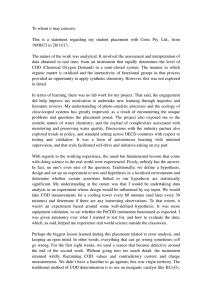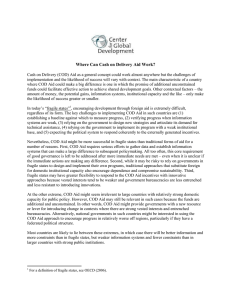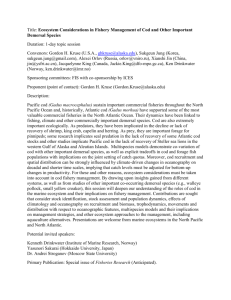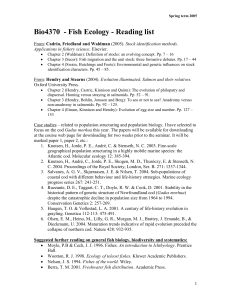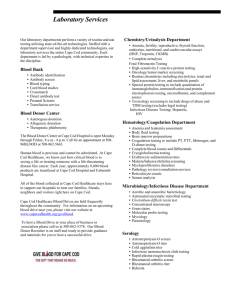Cash on Delivery Aid: Innovating to Improve Aid Effectiveness
advertisement
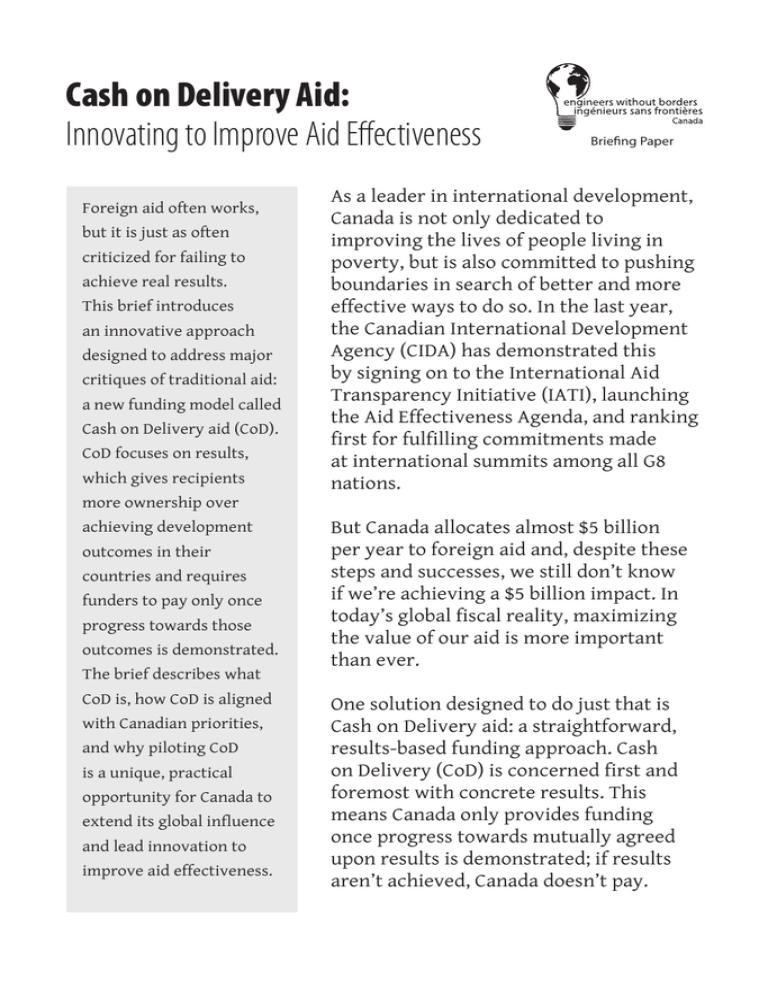
Cash on Delivery Aid: Innovating to Improve Aid Effectiveness Foreign aid often works, but it is just as often criticized for failing to achieve real results. This brief introduces an innovative approach designed to address major critiques of traditional aid: a new funding model called Cash on Delivery aid (CoD). CoD focuses on results, which gives recipients more ownership over achieving development outcomes in their countries and requires funders to pay only once progress towards those outcomes is demonstrated. The brief describes what CoD is, how CoD is aligned with Canadian priorities, and why piloting CoD is a unique, practical opportunity for Canada to extend its global influence and lead innovation to improve aid effectiveness. Briefing Paper As a leader in international development, Canada is not only dedicated to improving the lives of people living in poverty, but is also committed to pushing boundaries in search of better and more effective ways to do so. In the last year, the Canadian International Development Agency (CIDA) has demonstrated this by signing on to the International Aid Transparency Initiative (IATI), launching the Aid Effectiveness Agenda, and ranking first for fulfilling commitments made at international summits among all G8 nations. But Canada allocates almost $5 billion per year to foreign aid and, despite these steps and successes, we still don’t know if we’re achieving a $5 billion impact. In today’s global fiscal reality, maximizing the value of our aid is more important than ever. One solution designed to do just that is Cash on Delivery aid: a straightforward, results-based funding approach. Cash on Delivery (CoD) is concerned first and foremost with concrete results. This means Canada only provides funding once progress towards mutually agreed upon results is demonstrated; if results aren’t achieved, Canada doesn’t pay. Key Features of Cash on Delivery Aid 1. Pays for outcomes, not inputs With traditional aid, the funder (eg. CIDA) pays up-front. Recipients often spend huge amounts of time creating detailed expenditure reports, often at the expense of effectively evaluating project results. With CoD, the funder only pays when progress towards mutually agreed-upon outcomes (eg. x percent of children surviving to age 5) has been demonstrated. This decreases administrative burdens and helps create incentive to collect reliable performance information. 2. Reduces bureaucracy via hands-off implementation With traditional aid, the funder is very involved in planning and implementing development initiatives. With CoD, the recipient government chooses the strategy for achieving development outcomes. This gives recipients the freedom to employ the most effective and efficient ways to deliver those outcomes in their country, whether contracting an international company, engaging an NGO, or doing it themselves. This reinforces local ownership of and responsibility for development programs, and considerably reduces administrative costs. 3. Requires independent, third party verification CoD requires that an independent third party (ie. neither funder nor recipient) evaluate progress toward the agreed-upon outcomes, which is critical to the credibility of the CoD agreement. 4. Increases transparency through public dissemination The content of the CoD aid contract, progress achieved, and payments made must be made transparently and publicly available. This will help ensure that all parties fulfill their commitments, and strengthen the ability of the public and civil society to hold government accountable. 5. Complements other aid programs CoD is designed to complement, not replace, other aid programs. CoD should be introduced as an addition to current aid flows without disrupting ongoing programs, so that CoD’s effectiveness can be assessed relative to other aid mechanisms. In Line with Canada’s Priorities CIDA’s Aid Effectiveness Agenda commits to delivering results. Cash on Delivery maximizes the value of Canada’s aid, by only delivering funding once the partner country demonstrates progress toward mutually agreedupon results. Canada makes things possible; recipient countries make them happen. This also provides more and better evidence of how Canada’s focused aid efforts are making a difference. CIDA’s Aid Effectiveness Agenda commits to strengthening local leadership. Cash on Delivery contributes to enhanced global security and the national interest of Canadians, by facilitating the strengthening and stabilization of local leadership, political institutions, and civil society. It places the responsibility for program management and delivery in the hands of recipient countries. CIDA’s Aid Effectiveness Agenda commits to improving efficiency. Cash on Delivery decreases administrative burdens on both Canada and our partner countries, which in turn increases partners’ freedom and responsibility to manage and deliver on their development commitments. CIDA’s Aid Effectiveness Agenda commits to enhancing accountability. Cash on Delivery requires that all results be made public, which will better equip CIDA, Canadian citizens, partner country governments, and partner country citizens to understand how CIDA’s aid is being spent, and hold one another accountable to their commitments. It’s a logical next step in CIDA’s global leadership on aid transparency. Other Cash on Delivery Pilots At this time, the UK Department for International Development (DFID) and the Government of Ethiopia are the first and only aid organizations that have designed and negotiated an aid program based on the Cash on Delivery aid model. DFID will make grant payments to the education ministry for the increase in the number of students above a baseline that sits for or passes the national grade 10 exam. There will be additional payments for girl graduates compared to boys. A maximum of £10 million will be disbursed each year from 2012 to 2014. Canada’s Opportunity Despite its successes, foreign aid is frequently critiqued as ineffective. CoD offers a potential solution to many of these critiques, a solution that is distinguished by its simplicity. By giving recipients full responsibility and authority over funds paid in proportion to verified measures of progress, there is a clear incentive for political leaders to care about measuring their country’s progress against clear goals. Since funds are only transferred once results have been demonstrated, Canadian citizens can trust that their tax dollars are being used effectively. We do not pretend that CoD is a panacea for problems in the aid system. However, we believe CoD holds enough promise to be worth trying, adapting, and assessing. Piloting CoD is a unique opportunity for CIDA to affirm the values that have been hallmarks of Canadian development policy for decades, and take them a step further. Canada can—and should—continue to be a leader in innovation to improve aid effectiveness. CIDA can make this happen by piloting Cash on Delivery aid. Engineers Without Borders Canada is a movement of over 50,000 professional engineers, students, overseas volunteer staff, and supporters across Canada. We believe that poverty is the product of broken systems that prevent people form realizing their full potential. Beating poverty means making those systems work. EWB is working to do exactly that. info@ewb.ca ewb.ca @ewb

